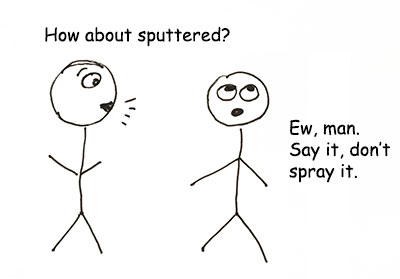
Beginning writers often think they need to inject extra interest or zest into their writing, and often they’ve been indoctrinated by English teachers who insist that they “add variety” with their dialogue tags.
That’s where we get novels littered with strange-sounding add-ons to perfectly fine dialogue. Using terms like uttered, exclaimed, or interjected can pull your reader out of the flow of your narrative and make them focus more on the words than on what you’re conveying with those words.
And let’s not even get started on ejaculated, the biggest dialogue-tag offender of all time!
Yet authors hear all the time that their writing needs to change it up, that they can’t just use the same phrases over and over, lest they bore the reader to tears.
Get a free sample proofread and edit for your document.
Two professional proofreaders will proofread and edit your document.
While that’s true for clichés and personal catchphrases, or even repetition of filler words like really or literally, there’s a dirty secret to fiction: simple, repetitive dialogue tags fade into the background.
Tags like said or asked simply become part of the mental furniture. Readers stop paying attention to them precisely because they’re so simple and common, and that’s a good thing. By letting the tags fade away, you’re drawing more attention to the dynamics of the dialogue itself.
So really, it’s totally okay to rely on said or asked or replied when writing dialogue, when you have to use tags at all. Read back through your dialogue passages and see whether you even need “he said” or “she responded.” Often, readers can tell who’s speaking, so you can eliminate the tags altogether.
Having trouble telling if a reader will be able to follow along? After all, you know who’s saying what in your tense argument, but then, you wrote it! If you’re not sure someone else can follow along, drop in a dialogue tag or two and then ask a trusted friend to read the passage. Confusing dialogue stands out, so even a non-expert editor will be able to point out big glitches. If you’re still not sure, consider hiring a professional editor to help you develop your draft.
Getting (Too) Fancy
Whatever you do, don’t rely on forced tags like “he chuckled” or “she grinned.” You don’t “grin” a statement. You can add these descriptors after the dialogue closes, as in:
Correct:
“So, you really think you’re going to beat me?” She grinned mischievously, clearly baiting him.
Incorrect:
“So, you really think you’re going to beat me?” she grinned.
Grinning does not cause words to come out. Neither does laughing or sighing. These are not ways to speak. You say something, then you sigh; you laugh, and then you make a remark. Many beginning writers think that they’re spicing up their writing or indicating a character’s mental state by using actions as dialogue tags, but in reality, it’s not helping. You’re better off indicating the action or mental state separately from the dialogue.
It’s also best to avoid using too many adjectives after your tags. It can get boring and doesn’t add a lot of depth to your writing.
For example:
“Let’s get this over with,” Alex said wearily.
is less powerful and evocative than:
“Let’s get this over with,” Alex said. His shoulders slumped as he ran a weary hand through his hair.
What to Do Instead
 As with so many writing mistakes, the solution is oddly easy: when in doubt, keep it simple.
As with so many writing mistakes, the solution is oddly easy: when in doubt, keep it simple.
Let your dialogue stand on its own and use straightforward tags like said and asked. Want to show how people are saying something? Try shouted and whispered.
Otherwise, stand back. Let your characters’ conversations flow, taking center stage. Trust your reader to follow along with you and to fill in the sounds with their own imaginations, and you’re more than halfway there.
Kate S.
Get a free sample proofread and edit for your document.
Two professional proofreaders will proofread and edit your document.
Get a free sample proofread and edit for your document.
Two professional proofreaders will proofread and edit your document.
We will get your free sample back in three to six hours!